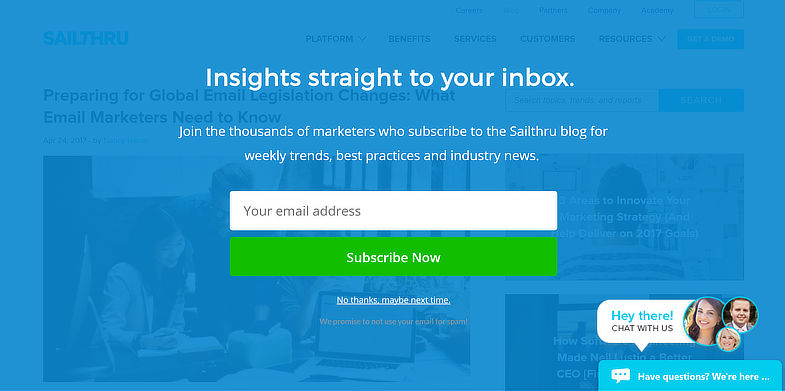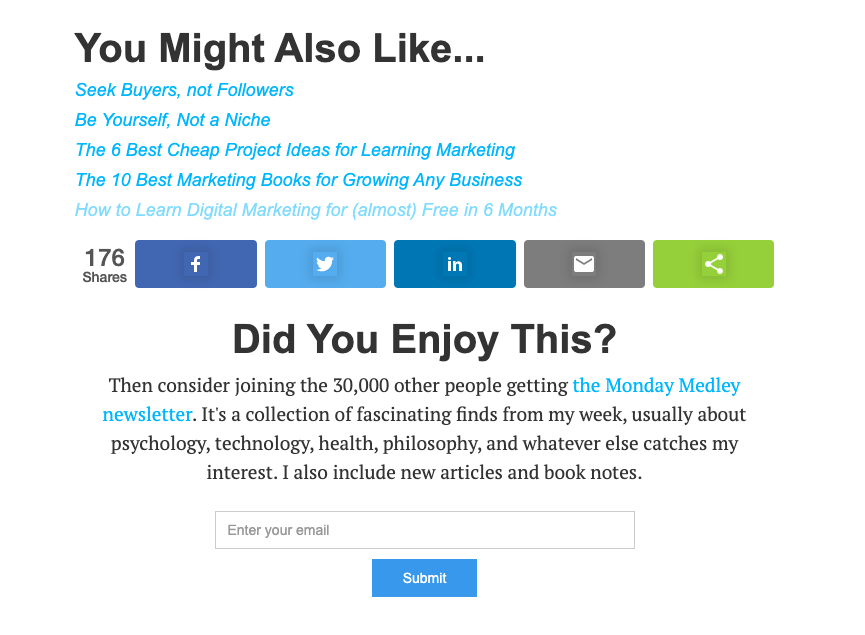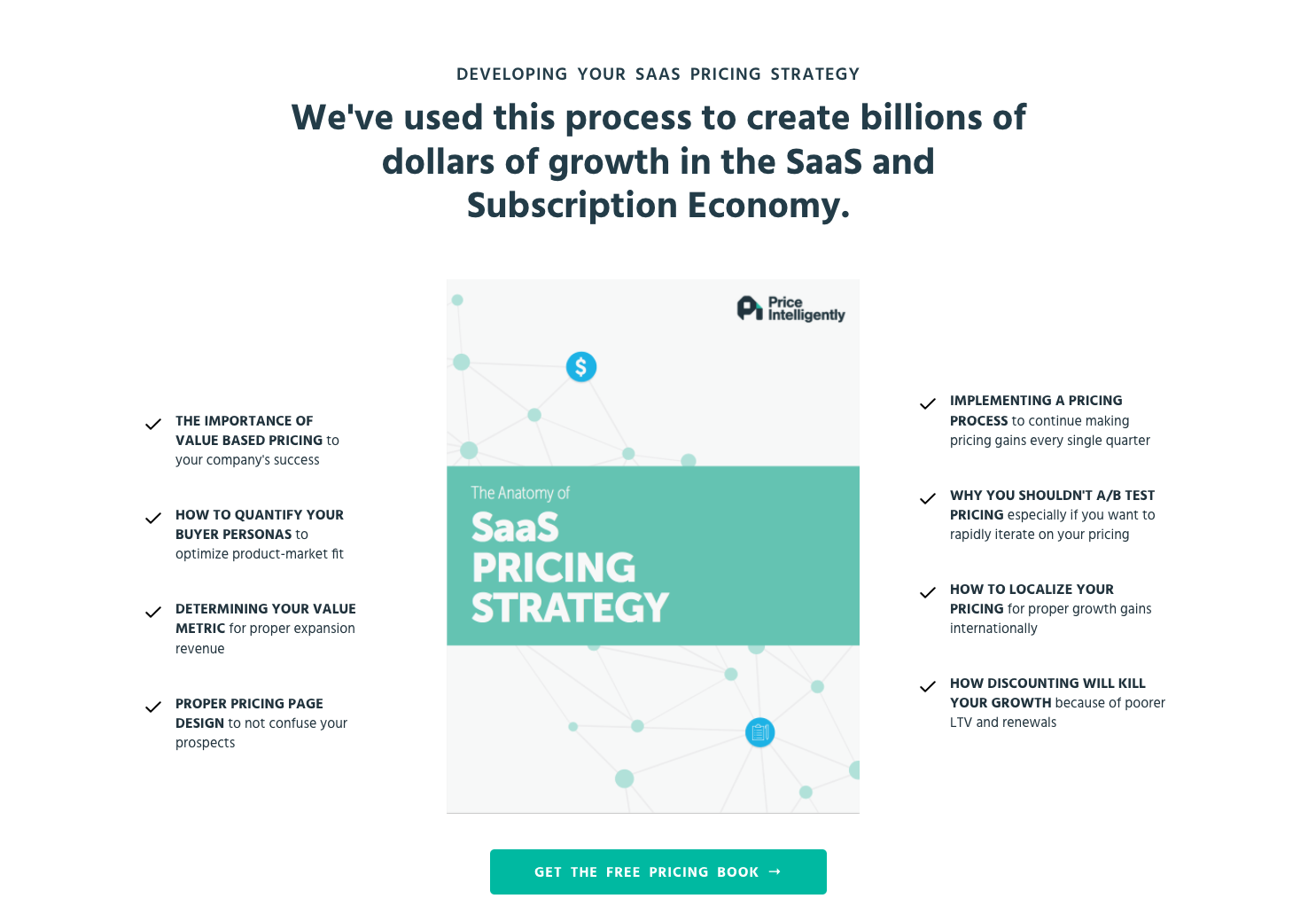Marketers, myself included, love to think about themselves as part of their customers' lives. So we say that marketing is all about relationships, trust, loyalty, and other concepts that we shout for anybody that's listening in the hope of feeling good about ourselves.
Lucky for us, from time to time, a new concept pops up that gives us precisely that, the excuse to keep harming and ruining the world for everybody.
Two of these concepts are Permission Marketing, and Reciprocity. Two brilliant concepts, created by two brilliant people; Seth Godin and Robert Cialdini.
And what did we do with those concepts?
We did what marketers do best, misinterpreted them, and screwed with them.
Permission marketing now is annoying marketing
A common-sense idea today, or at least should be, was revolutionary in 1999. Seth Godin told us that if we wanted to market to people, we should get their permission first, and then start a relationship with them.
Why? For the same reason, you don't walk towards a stranger on the street and ask them to go on a trip with you worldwide unless you are from the Youtube channel YES Theory.
People need to trust you before you ask them to do anything for you, especially spend their hard-earned money on your business.
Everyone understood the message, or at least they thought they did.
What is the best way to contact a customer these days? Well, not the best, but when you sum the easiness, the costs, the response rate, and everything else, Email is the vehicle of choice.
So it begins; we have to have permission to collect their emails and start a relationship. Then things started to go south real quick.
Marketers became more aggressive in their tactics, Popups to collect emails started chasing website visitors everywhere.
Before you could read a blog article in peace, and after that, marketers would ask you to provide your email. Nowadays, before you even read the title, a full-screen popup will emerge out of the dark dungeons of Javascript, ready to get your email address.
 Full-screen popup from Optinmonster
Full-screen popup from Optinmonster
Hey, wait a minute. What insights? I don't even know if I like what you have to say. Let me decide if there is value, before asking me to join thousands of marketers or whatever is your request.
This is not asking for permission; this is fighting a customer until submission – the email address being your victory.
Clearing up any misinterpretation
I'm not saying that you shouldn't collect emails. But, as I said before, email is one of the best ways to keep in touch with your customers.
What I am saying is:
Instead of battling with your visitors for their emails, stalking them everywhere on your site, making your full-screen popups, or even a popup in the center of the screen, maybe you should have an inline form at the end of a blog post asking for their email.
Hell, you could even use a discrete popup in the bottom corner of the screen making that request. But please let people make up their minds, focus on giving value to them instead of forcing them to give you their contact.
Nat Eliason does this masterfully in his blog. Well-crafted content, with a lot of value, and at the bottom of the page, he recommends other articles that you might like and has a form where you can subscribe to his email list, only if you like his stuff.

I am a fan, so it's easy to say all these good praises about Nat, but this is how we should do things.
All this talk about email capturing takes us to my next rant; Reciprocity.
Reciprocity shouldn't be a transactional trap.
Reciprocity is another concept that marketers decided to abuse ad nauseam, tying it with getting an email address that they can use later to sell stuff.
In the book Influence, Robert Cialdini says that:
By virtue of the reciprocity rule, then, we are obligated to the future repayment of favors, gifts, invitations, and the like.
The concept is simple: if someone does something nice for you, you feel the need to repay that debt.
How should it work in a business? Well, you do something nice for your customers, you go out of your way to help them solve a problem, you give them a gift card, or a discount to encourage them to do business with you.
What did a lot of marketers understand? I can create these useless PDFs with a title that will trick people to think there is value in them and exchange it for emails that I can later use to sell them stuff.
I have nothing against lead magnets, when they are well crafted and provide real value. See, this reciprocity thing should be about giving something to other people, not trying to take from them without giving anything of value.
This way you will make people feel cheated, and of course, marketers will start to blame the concept because it doesn't work – as I saw someone doing in a Facebook group.
One example of a great lead-magnet is what Profiwell does:

Instead of putting together a halfass PDF in exchange for your email, they go deep in the subject.
A better example would be Russell Brunson:

The guy gives away books, hard copy books to help you understand his concept of marketing funnels. One could argue that he only does this to sell his software, and his masterminds and all the other upselling that he is great at.
I am inclined to agree with all of that, but he teaches you exactly what he is doing, not all his secrets of course, and if you learn the broad message, I don't think you need his software to send your emails or to put together funnel pages.
The thing is, what he teaches may or may not return as money for his business.
What should I do then?
By the examples I gave you, you might be thinking that you don't have resources to put together an In-Depth Guide or let alone give people copies of physical books for free; and you don't need to do any of these things.
If you believe that marketing is about relationships, what you need to do is get to know your customers, not just the problems they face related to your product or service, but their daily struggles, and then you could help by pointing them in the right direction. For example, let's say you have a SaaS that allows small businesses to automate and organize their invoices. However, many owners might be struggling with accounting, and because they are small, they can't afford to hire the known firms in their city/state.
You could research accountants that are experts in small businesses that charge a fair price for their services and then compile them on a PDF and send it to your customers.
This is not your core business, and there is no money to be made directly from it, but it signals a lot to your customers. And if you want to make it available for people that might be having the same issue, you could or could not ask for an email address in exchange for it.
Keep in mind that the gift is the most important thing. If it comes back in the form of a new client or another purchase from an old client, so be it.
Enjoyed this article?
Get more email marketing tips delivered to your inbox. Join 4,000+ marketers.
No spam, unsubscribe anytime.



